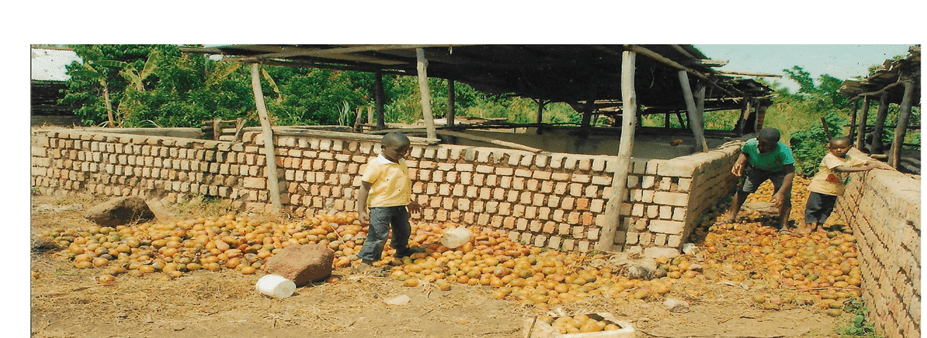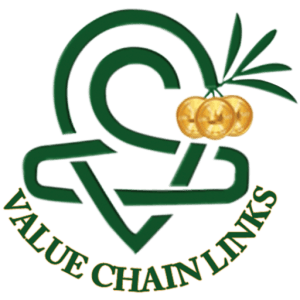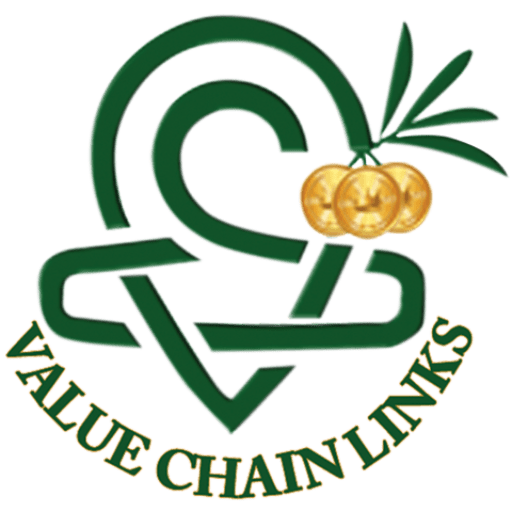THE POSTHARVEST HANDLING PROBLEM SOLUTION

Mr. Sam Bagampadde Kisauzi, a resident of Kyajiija Village, Mabuye parish ,Kalungu District is a local famer whose emphasis is on mango growing and poultry together with a piggery unit among others. He began mango growing as early as 1984 with other fruits which he later abandoned and emphasized on mango growing with about 8 acres of differing types. Due to the high motive and desire for developing the land to acquire ownership, he was forced to specialize on a more feasible project which was mango growing together with goat raring and cattle keeping .He later increased on the size of his mango farm up to 15 acres till today. visit his profile here. He has done this through so many difficulties like prolonged gains ,unreliable market ,unproductive seasoning, poor harvest and postharvest handling techniques, bush burning & drought which dries up seedlings, increasing costs in terms of replacing accidental growing of low yielding mango varieties which have always been discovered after a long time of waiting for them to start yielding among other challenges. However Mr. Bagampadde has been able to overcome all these challenges through hard work persuasiveness and above all patience. This has resulted into him having over 550 mature trees of various varieties. On addition to the mature trees, there over 350 trees of growing seedlings which are still under primary stage. In his area, not only does he grow mangoes but also rears poultry and pigs which provide manure. The local community members have also copied his idea of mango growing and this has led to the need for a better way of handling this increasing supply which can’t be controlled artificially since mango yielding is a natural phenomenon and it occurs seasonally. Hence Fruit driers and a cold room have been identified by Mr. Bagampadde as a reliable solution to this scenario using his experience in as far as mango production and trends are concerned .He therefore describes his proposal as a feasible project with smug satisfaction. Part of his farm is organic and this also gives his produce a high chance to the export market but he is being limited by the preservation and quality maintenance .With driers and a cold room, he can also form a basis for further value addition and also attract the neighboring communities to growing more mangoes in the area, his farm being the nucleus farm in the area connecting smaller farms to market.

THE PROBLEM
The rural poor – the majority of whom are smallholders and predominantly women and youth are facing challenges in sustaining their livelihoods mainly as a result of declining productivity of coffee that used to be their main cash crop, land fragmentation and climate change among others. The region therefore has to diversify the cash crop base starting with transformation of crops., that have hither to been grown for subsistence into commercial crops as well as structuring a collective mechanism aimed at uniting these farmers so as to bridge the quantitative bottlenecks associated with smallholder farms that dominate subsistence capacities. Mangoes are such a crop. It is particularly suitable because a few trees can be grown on a small piece of land. If these are of a variety that bears fruit that have a market they can make substantial contribution to the incomes of resource poor farmers. This requires intensive management utilizing scientifically validated agronomic, pest and disease control practices and adding substantial value given that mangoes are perishable. However, there is a problem of poor postharvest handling which are not only affecting mango farmers but also majority of the country’s labour force since the agricultural sector, in which this problem entails employs the biggest population of Ugandans. This therefore implies that the population of Uganda in general suffers the effects of this problem hence arousing the need to come up with a solution.
This proposal aims to support mango farming which has become a source of live hood to majority of the vicinity famers of Kalungu district with a variety of mango fruits being grown at a commercial basis unlike in the old days when they were only grown at a subsistence scale. However, with such efforts in place, a number of challenges have been encountered such as fruit pests and diseases, excess supply during the season and lack of off season supply, limited information about markets and their unreliability, poor postharvest handling facilities hence poor quality produces among other challenges. This paper entails to find solutions to the latter as it has been identified as one of the leading challenge considering a number of physical engagements and visits to mango famers. The problem has been triggered by limited capital to purchase the required equipment hence use of rudimentary technology in harvesting and storage, lack of technical support and knowledge about the existing technics in value addition, high costs to gains ratio considering the prevailing prices in the local markets, the perishability nature of fruits which makes them prune to harvest damages among others. A cold room as a storage facility to store the fruits to be processed has been identified as a possible solution since most fruits tend to ripe at almost the same interval yet they can’t be consumed at once. It also helps to avail fruits for processing during off season which helps to maintain a steady supply. Secondly, there is a need for fruit driers so as to process these fruits. This is because of the state of various fruit varieties whose natural appearance does not look appealing to buyers such as having spots and irregular shapes as well as a few reasonable damages that don’t change the nature value. These can be sold out once processed in a dried form other than being lost or sold cheaply. Even those that happen to be stored for a long period in the cold room tend to loss the natural appearance; therefore they can also be processed and sold out at a better price unlike the unprocessed ones. This is the problem this intervention shall attempt to solve.
PROPOSED SOLUTION
The theory of change of change on which this project is based is that transforming mangoes into profitable cash crops will come from;
- A supportive and sustainable facility in form of a cold room and fruit driers to store and add value to mangoes respectively.
- Supporting champions who are already actively engaged in mango production to transform their enterprises into technology demonstration and innovation centers that support smallholder and emerging farmers.
- A very good understanding of the bottlenecks in the mango value chain in the socioeconomic context of the region and targeting interventions at these bottlenecks.
GOAL
The goal of the Project is to integrate commercial mango farming into the cash crop diversification strategy for youth, women and resource-poor vicinity farmers of Kalungu District.
The Overall Project Objective is to set up a mango postharvest and value addition facility as the vehicle for facilitating the transformation of the mango value chain in ways that are profitable for all the value chain actors in the region and beyond. The specific objectives are:
- To support the transformation of a commercial mango producer into a champion
- To support the value chain actors to design/ develop and implement new innovations.
- To contribute to the development of the mango value chain in the country by scaling up and out the lessons learnt.
- To support linking up of small holder farmers to acquire a steady market for their products
ACTIVITIES
- Transforming the Bagampadde family mango farm into a mango development and innovation Centre through a public-private partnership and supporting the introduction of tested and proven technologies for overcoming the known immediate challenge of reducing post-harvest losses through establishing a postharvest handling facility in form of a cold room and mango driers. This will involve processing of mango fruits into the various mango products through drying, branding, packing and packaging, storage marketing and sales while increasing profitability in mango farming.
- Identifying the possible niche markets for the mango products, occupying various local and international markets, promoting sales and marketing of the mango products.
- Undertaking a participatory mango value chain analysis so as to identify the bottlenecks and overcome them at all stages of mango farming through the creation of a Mango Innovation Platform as the center of excellence.
- Monitoring, evaluation, learning and sharing of lessons and experiences.
HOW TO DO IT
The design for the set of interventions relies on the available mango fruit tree varieties on Mr. Bagampadde’s organic farm and other vicinity mango farms of Kalungu District. The goal will be achieved starting with forming and registering a company as a private public partnership and patterning with VALUE CHAIN LINKS, and Nkoola Institute Development Associates (NIDA) for consultancy to build the technical capacity as development partners. This will help to insure high quality and quantity of the products so as reach out to possible niche markets locally and abroad in particular as well as gaining consumer confidence and trust.
Later, with the help of funding, we hope to set up a facility of driers and a cold room. The facility is expected to be set up in Kyajija village, Bukulula Sub County in Kalungu District at Mr. Bagampadde’s mango farm premises since his farm is the nucleus of all mango farms in the area. We also hope to carry out all forms of training and demonstrations in the same place and this is expected to take around 6months but subject to the available funding. Recruitment of workers and training in value addition shall take place thereafter. To ensure quality output, Farm Gate Services Limited shall be contracted to handle management in the initial stages of production due to its advanced experience in food handling technology. After acquiring the necessary skills and competence in fruit handling, the company shall then be run by its own management. Successful implementation of this strategy shall be done by Value Chain Links as the lead Organization.
EXPECTED OUTPUTS
- An operational Mango Innovation Centre with facilities for storing excess mango supplies during plentiful supply as well as adding value.
- At least 500 farmers (at least 50% women and 70%youth) actively participating in mango production and or related value chain activities.
- At least one innovation adopted/adapted/ developed and being utilized for overcoming each of the priority constraints identified in the value chain analysis.
- Lessons learnt scaled up and out within the national mango value chain.
EXPECTED BENEFITS
- Creation of jobs in mango production and associated value chain activities.
- Enhanced incomes and consequent improvements in the livelihoods of mango farmers.
- Contribution to the district and national agriculture sector development objectives.
IN SUMMARY
This project aims to gradually and sustainably develop the mango and mango products’ production so as to integrate mangoes into the cash crop diversification strategy for youth, women and resource-poor vicinity farmers of Kalungu District with the Bagampadde mango farm as the center for excellence. This shall be achieved by:
- Establishing a mango postharvest handling and value addition facility with an aim of empowering stakeholders in the mango value chain.
- Supporting the introduction of new innovations such as mango whisky, mango crisps, mango pulp, mango jam, dehydrated pulp, pickles and chutneys from the fresh mango fruits.
- Undertaking a participatory mango value chain analysis as well as networking to know the mango varieties and products required on the specific market.
The outcomes of the project are expected to be increased number of youth, women and resource poor farmers engaged in profitable and sustainable commercial mango production hence leading to improvements in their livelihoods, promoting advocacy through collective lobbying and, enabling the mango producers to sustainably link with external local and international markets with the postharvest handling and value addition facility as the vehicle for facilitating this transformation. This facility is expected to be established at Mr. Sam Bagampadde Kisauzi’s mango farm in Kyajiija Village, Mabuye parish ,Kalungu District, a local famer whose emphasis is on mango growing.


